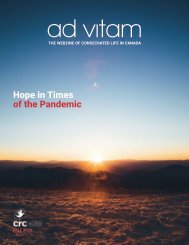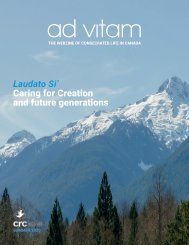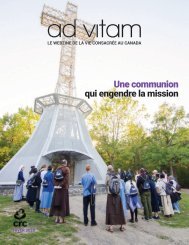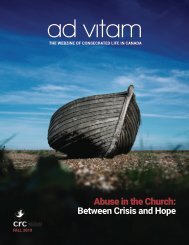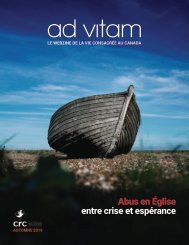ad vitam - Winter 2020
READING TIPS The ad vitam webzine is unique in its offer of an integral and interactive experience featuring articles and audio-visual content. We strongly suggest that you read it online, ideally on a computer or tablet (not recommended on a smartphone). To zoom in: on a computer, double-click or use the + and - found at the bottom-right of the screen; on a tablet, double-tap the screen. Use your mouse or finger to move throughout the page. It is possible to download a PDF of the webzine, however the file will not support links and audio-visual content. For environmental reasons, we invite you to limit printing of the PDF. You may contact us if you wish to obtain a text-only version of a specific article. We hope that as you acquaint yourself with our webzine over time, you’ll enjoy the enriching experience of its unique format. We welcome your comments and questions at info@crc-canada.org.
READING TIPS
The ad vitam webzine is unique in its offer of an integral and interactive experience featuring articles and audio-visual content. We strongly suggest that you read it online, ideally on a computer or tablet (not recommended on a smartphone). To zoom in: on a computer, double-click or use the + and - found at the bottom-right of the screen; on a tablet, double-tap the screen. Use your mouse or finger to move throughout the page.
It is possible to download a PDF of the webzine, however the file will not support links and audio-visual content. For environmental reasons, we invite you to limit printing of the PDF. You may contact us if you wish to obtain a text-only version of a specific article. We hope that as you acquaint yourself with our webzine over time, you’ll enjoy the enriching experience of its unique format. We welcome your comments and questions at info@crc-canada.org.
Create successful ePaper yourself
Turn your PDF publications into a flip-book with our unique Google optimized e-Paper software.
In <strong>ad</strong>dition to the ordinary, well-planned pastoral ministry<br />
that parishes and movements carry out, it is also important<br />
to allow room for a “popular” youth ministry, with a different<br />
style, schedule, pace and method. Bro<strong>ad</strong>er and more flexible,<br />
it goes out to those places where real young people are<br />
active, and fosters the natural le<strong>ad</strong>ership qualities and<br />
the charisms sown by the Holy Spirit. (...) We need only to<br />
accompany and encourage them, trusting a little more in the<br />
genius of the Holy Spirit, who acts as he wills.<br />
Post-synodal Apostolic Exhortation Christus vivit, no. 230.<br />
Towards an intergenerational communion<br />
The story ends by mentioning that community<br />
members “took the boy away alive”<br />
(v. 12). Encouraged by Paul’s example, the<br />
community takes an interest in the boy and<br />
now takes charge of his progress in the faith.<br />
The community initiates him into the Gospel.<br />
Less focused on itself, the community opens<br />
up to this young person and opts for a catechetical<br />
approach <strong>ad</strong>apted to his reality. Paul<br />
took the initiative to go to a young man in spiritual<br />
agony, but he was able to bring along the<br />
whole community in his wake. The communion<br />
of the Christians of Troas thus expands to<br />
become truly intergenerational.<br />
Our communities face-to-face with youth<br />
Where are we in our religious communities?<br />
Are we still concerned with awakening the<br />
younger generations to the faith? Do we tend<br />
to withdraw into ourselves, fulfilled by the liturgies<br />
that we celebrate among ourselves? Do<br />
we have our eyes open to discern the needs<br />
of the younger generations or do we just lock<br />
ourselves up in our homes? Would we have<br />
conversions to make, personally and in community,<br />
to be more like Paul? Would we have<br />
to review our priorities as he himself was able<br />
to do?<br />
In Can<strong>ad</strong>a, a large proportion of young people<br />
attend neither our churches nor our pastoral<br />
activities. Like Eutychus, they seem indifferent<br />
to the Word of God and, like him, they risk<br />
falling into spiritual death. Wouldn’t they need<br />
someone to go up to them and look carefully<br />
at what they’re going through? Could it be that<br />
the risen Christ needs us to express to them<br />
a presence of tenderness? Could this be one<br />
possible way to arouse an awakening to life<br />
with Christ?<br />
To continue the reflection<br />
1. What personal and community conversions<br />
does the story of Acts 20:6-12 urge<br />
us to make?<br />
2. Taking into account our reality (age,<br />
health, availability, etc.), what concrete actions<br />
could we take to get closer to what<br />
Paul and the Troas community experienced<br />
with regard to youth?<br />
16 • AD VITAM • WINTER <strong>2020</strong>




